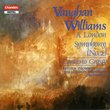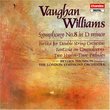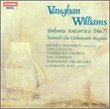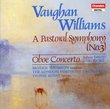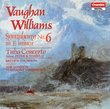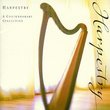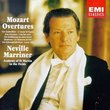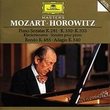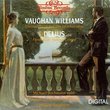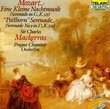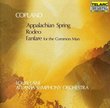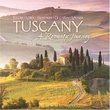| All Artists: Ralph Vaughan Williams, Bryden Thomson, London Symphony Orchestra Title: Vaughan Williams: Symphony No. 5 / The Lark Ascending Members Wishing: 1 Total Copies: 0 Label: Chandos Release Date: 10/28/1992 Genre: Classical Styles: Forms & Genres, Concertos, Historical Periods, Modern, 20th, & 21st Century, Instruments, Strings, Symphonies Number of Discs: 1 SwapaCD Credits: 1 UPC: 095115855423 |
Search - Ralph Vaughan Williams, Bryden Thomson, London Symphony Orchestra :: Vaughan Williams: Symphony No. 5 / The Lark Ascending
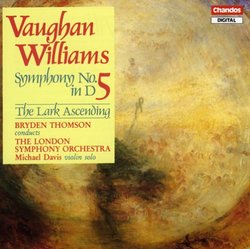 | Ralph Vaughan Williams, Bryden Thomson, London Symphony Orchestra Vaughan Williams: Symphony No. 5 / The Lark Ascending Genre: Classical
|
Larger Image |
CD DetailsSimilar CDsSimilarly Requested CDs |
CD ReviewsDefinitive symphony ? jean couture | Quebec city - Canada | 06/04/2002 (5 out of 5 stars) " The Symphony No.5 is one of Dr. Vaughan Williams's most beloved pieces ; this is one of the most beautiful symphonies of all the English repertoire--if not the most beautiful. First performed in June 1943, the work was dedicated "to Jean Sibelius, without permission" and contains bits and pieces of the composer's then-unfinished opera Pilgrim's Progress (that was, indeed, a work in progress at the time). Bryden Thomson's warm and resonant tone sits comfortably in the four movements of this symphonic gem. Sound is quite excellent ; orchestral details are uniformly audible. The sound is typical Chandos : Warm, smooth and quite natural in perspective. Previn's Telarc recording of the same symphony is even better, technically, with towering sonics. Dynamic range is obviously good on the Chandos/Thomson, but here--on that specific point--the Telarc/Previn as well as the EMI/Haitink seem slightly better. The huge sound of the Telarc provides great impact and breadth. Glorious recordings exist in the realm of monophonic sound : Barbirolli and Boult are admittedly the very best as interpretation goes, but the sonics could not bid fair comparisons with later stereo recordings and, above all, with stereo recordings of the digital era. Boult's early version for Decca is, especially, a significant archive. The Halle Orchestra, conducted with magic by Barbirolli (1944), is also artistically momentous (even if the recording leaves much to be desired). John Barbirolli did, in the early 1960s, a second--very good--version of the Fifth Symphony (hailed as one of the top versions) with the Philharmonia Orchestra : The EMI Angel stereo sound, although fairly good, is not exceptional. Adrian Boult's EMI stereo recording, with the London Philharmonic, is also one of the favorites. His versions of the Third and Fifth symphonies remain classics in the catalog. While the recording of the Fifth is not absolutely first rank (there are better sounding ones, including Thomson's), the wind instruments and the strings resound with glowing refinement and control ; compared side by side to Thomson's, Boult's reading is somewhat on the dark side of the score. The occasional orchestral bursts are solid, perhaps to remind you the LPO was also capable of huge power. There's something positively special in that reading--whether it lies in its underlying intensity or in the peaceful nobility it inspires is not thoroughly sizeable. Boult's approach was not so much different from Thomson's, after all ; the LPO (recorded in Wembley Town Hall in the late 1960's) sounds appropriate and well-balanced for that kind of program. The nearly impressionistic approach VW took in the fabrication of this most unique symphony shines through under Thomson's baguette. Bryden Thomson's superbly played Scherzo has a special merit : The climate is quick and naturally flowing (again, not too different from Boult). Some may find Haitink's version quite satisfying but i feel rather uncomfortable with his Scherzo which sounds kind of "confused" and seems to be going nowhere. Just compare the latter to Barbirolli, Boult or Previn--or to the marvelous Scherzo as it is directed here by Thomson. Vernon Handley (with the RLPO, on EMI) has done a quite nice rendition of this masterpiece. Here the EMI sound is honest, just as the orchestration ; Handley is one of the great exponents of this typically British music. Some say his Fifth is one of the best, and i agree. By the way, i urge you to check out his wonderful Third from the same cycle (EMI/Classics For Pleasure). The beautiful 'Lark' is also quite good on the Chandos, although not comparable to the delicate melodies and riveting technique of the solo violins of either Jean Pougnet or Hugh Bean. Thomson's Fifth is a favorite. If there are a couple minor flaws here and there, it does reveal yet some distinct and intimate qualities. The beauty (and I mean BEAUTY) of the strings alone makes for a most appealing account. I own the nine VW symphonies by Thomson and find the Fifth to be one of his best recordings (possibly the best). It is likely that Previn's reading (his Telarc, more than his RCA) is the greatest sonically and intellectually. Previn deserves top recommendation for it's sheer refinement, technical height and musicality--so much different from his negligible Curtis Institute recording (EMI Angel 55371 CD). Overall, Vaughan Williams's Fifth Symphony is a fine and graciously atmospheric piece of music. There's more than just one excellent recording ; Boult and Barbirolli i come to admire especially. You might also want to investigate on Hickox and Bakels who gave the Fifth very good performances in their own rights. Hickox is a positively surprising conductor and quite probably the BEST interpreter of English music these days (do not pass over his recordings of Rubbra, they're fabulous). The first movement of the Fifth didn't fail to paint pictures in my mind ; i imagine the departure of ships, fading slowly in the distance under the twilight. That movement is the most "frigid" of the four and, somehow, the most somber. Of course, those remarks are quite subjective and my view could differ from yours. The first movement also serves as a sort of introduction to the rest of the work (but it is not an intro as such). The atmospheric music is not at all programmatic. The Scherzo makes for a sublime part, at least as great a work as the Scherzo 'Nocturne' from the Second Symphony. I've always found this movement a bit Stravinskyan and its enthusiasm makes for a most welcomed "bridge" between the first movement and the crucial Romanza. It has compulsion in it, a good deal of movement--as opposed to the relative slow motion of the first movement. In some versions, it reminds me a few quotations from 'L'Oiseau de Feu' (Feuervogel), thus the kind of "ballet music" aspect it can produce. As a piece of music it certainly sounds ironic but never acrimonious (the cynical final movement to the F Minor Symphony makes for a good contrast). The Romanza is, of course, the centrepiece of the Fifth Symphony and contains great melodies where wind instruments play a major part. The movement ends peacefully, with a sort of Lark Ascending-esque violin presence. That music surely defines transcendence. The last movement, Passacaglia, is also a memorable piece ; quite "English", ennobled, if not Londonian or Edwardian in character (think of Elgar, Parry and Stanford), it drives a gorgeous symphonic work to a perfectly suitable ending. On most recordings of the Fifth we can feel that connotation to spirituality (though the "spiritual theme" is not implied directly) ; Bunyan's Pilgrim as well as memories of the Third ('Pastoral') Symphony are, sometimes, encountered. This record (Chandos/Thomson) doesn't fail to provide a serene and spiritual atmosphere, universal and luminous, and also faithful in regards to the composer's technique. Of course, i recommend this CD without hesitation. For more than five good reasons this symphony is a musical marvel. God bless the man who created that music! *****" Best of The Symphony #5 Releases & Lark Ascending Uncle_Audio | Redwood City, CA USA | 09/18/2004 (5 out of 5 stars) "This is the best release of Ralph Vaughan Williams' Symphony #5. This superb piece of symphonic music has been genuinely rendered by Bryden Thompson and the lesser known London Symphony Orchestra. I'm sure RVW would have concurred whole heartedly. Exceptional recording with outstanding dynamic range captured with clarity and elegance. This recording is best listened to without a lot of outside distractive noise. The kind of piece one revels in with eyes-closed and the senses seem heightened by sweeping illustrative musical brush strokes. The Lark Ascending is a classic in its own right. I am almost tempted to recommend this recording based on this rendition of the Lark Ascending alone! Also, one of the finer renditions from the LSO. The label; Chandos, is a highly respected, almost boutique recording company that prides itself on adherence to the highest standards of digital acoustic recording and engineering. This would be a superb addition to any symphonic library, and an illustrious example of the works of Ralph Vaughan Williams. Highly Recommended!" Excellent British Music Michael S.Winningham | Bangor, Maine United States | 11/01/2000 (5 out of 5 stars) "On this CD Thomson has given us a version of what has been called one of Vaughan Williams finest symphonies, that glows with warmth and feeling. Vaughan Williams was, as many know, a semi-impressionist composer, and this work seems to be a direct result of this impressionist feeling. Strings and winds work beautifully together in this passionate work, and one is deeply moved during almost all of the work. You must get this CD!!"
|

 Track Listings (5) - Disc #1
Track Listings (5) - Disc #1